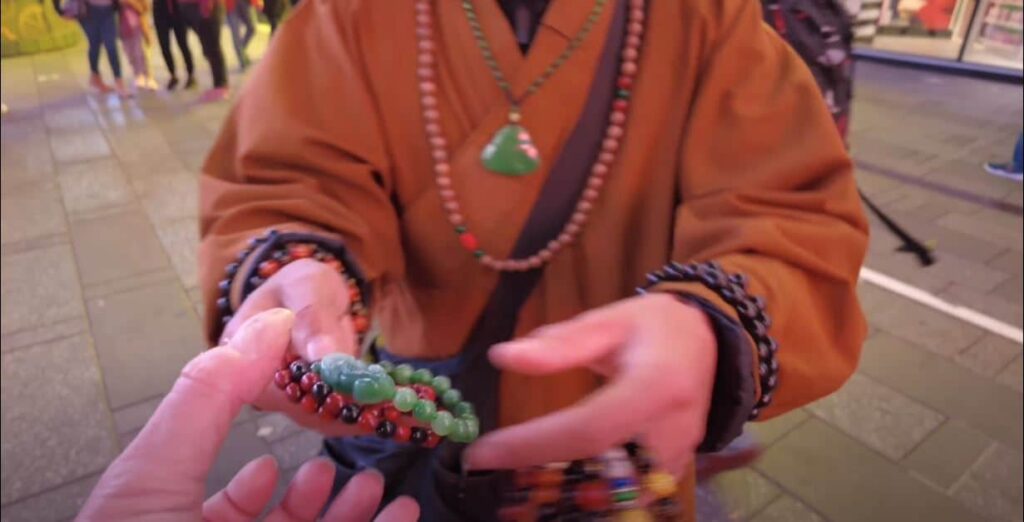These scammers will pose as monks, nuns or gurus of some cult or religion.
This scam is not exclusive to the vicinity of temples and religious structures. Indeed, it is very probable to find these people in all crowded tourist areas, religious and not.
What they will offer you, the religion professed, and their clothes will depend on the country you are visiting.
1) How it works
In Asia it is possible to find fake buddhist monks or some other fake figure of traditional religions of the continent.
In the western countries it might be easier to come across false monks, nuns from some hare krishna or buddhist cults or monotheistic religions.
These are just two examples. The world is full of faiths, cults and religions that scammers could imitate to try to get money from tourists.
Once they get close, the scammers will use their disguise to gain your trust. They will smile and ask you questions, maybe tell you that you have a “peculiar aura” or something like that.
Scammers might use this first approach to understand if they have room to act and how much they can ask you as a “donation”.
After a short conversation, they will start with their requests.
Other times, like the examples in the photos and the video below, scammers might try to approach you and just attempt to give you something while saying as little as possible.
They might:
– Ask directly for a monetary donation.
– Offer a blessing or a book. Or a blessed object, such as a golden painted medallion or a “holy” version of the friendship bracelet (like in the pictures).
Then they will ask for a minimal donation. They may even start to annoy you or, rarely, become aggressive if you accept the gift and don’t pay.
– Ask you to follow them to visit a place or take part or assist in a ceremony or ritual.

2) How to deal with them
– Be aware of your surroundings. Don’t let people take you off guard.
– Always remember that <<Barba non facit philosophum, […]>>. It means that the appearance doesn’t make the person.
– Check to the main article, “Free” Gifts And Blessings Scams, here for tips about this scam.
– If different from yours, do your research on local religions, beliefs and customs. It is not a must but still might be useful and interesting knowledge to have (e.g., as far as I know, Theravada buddhist monks can accept donations but can’t ask or beg for money).
– In general, it might be difficult to distinguish a real monk, nun, wiseman or woman or pilgrim from a scammer.
First red flags will come from the context and whether they ask you to do or donate something in the middle of the conversation (check How it works and Extras and Thoughts).
– Pay attention on how they behave, scammers will tend to get to their point as soon as possible.
– Do not accept amulets or bracelets from self-entitled random religious people. Especially if they insist on handing them to you.
– Do not make donations or purchases solicited by these wandering scammers. Local or international religious institutions shouldn’t target random tourists and travellers for donations.
– If you have the impression that you are dealing with scammers, do not follow them. Even and especially if they insist. You could end up in a tourist traps zone, a fake ceremony or worse.
The typical encounter with a Fake Buddhist Monk offering a blessed bracelet. From Jason Rupp’s testimony (check the Extras and Thoughts below for more details).
3) Extras And Thoughts
My Experience
A friend of mine once bought a book from one of these characters in Salina (IT). The scammer used the Hare Krishna script with a final blessing.
Also, in Thailand, I have come across a few of these scammers and gurus, mostly foreigners (a couple of them even westerners).
I’m not saying that all the monks, nuns and pilgrims you will meet are scammers.
Indeed, in my travels, I have more often met real wise pilgrims and monks in temples and ruins. And had profound and beautiful conversations with them, receiving and giving sincere blessings.
In a genuine and sincere encounter you will share ideas, experiences, information and advice. You might even share resources and perhaps exchange small gifts.
All this will be clear and unsolicited, it will be natural. Above all, you won’t have the constant feeling of having to chase away an annoying mosquito.
Credit
The frames and video for this article are provided by Jason Rupp. If you’re interested in some tips or inspiration on where to go and what to do for your next trip, check out his YouTube channels here and here.
Main Post and Thread
Remember that this is a variant of the “free gift and blessings scams” article. You can check it out by clicking here.
The others (some of them will be soon in our Archives) are:
• Friendship Bracelets
• Forced Bindi
• Henna street “tattooists”
• The lucky object, charm or blessing
• Street rose sellers
• The Good Man in Distress.
